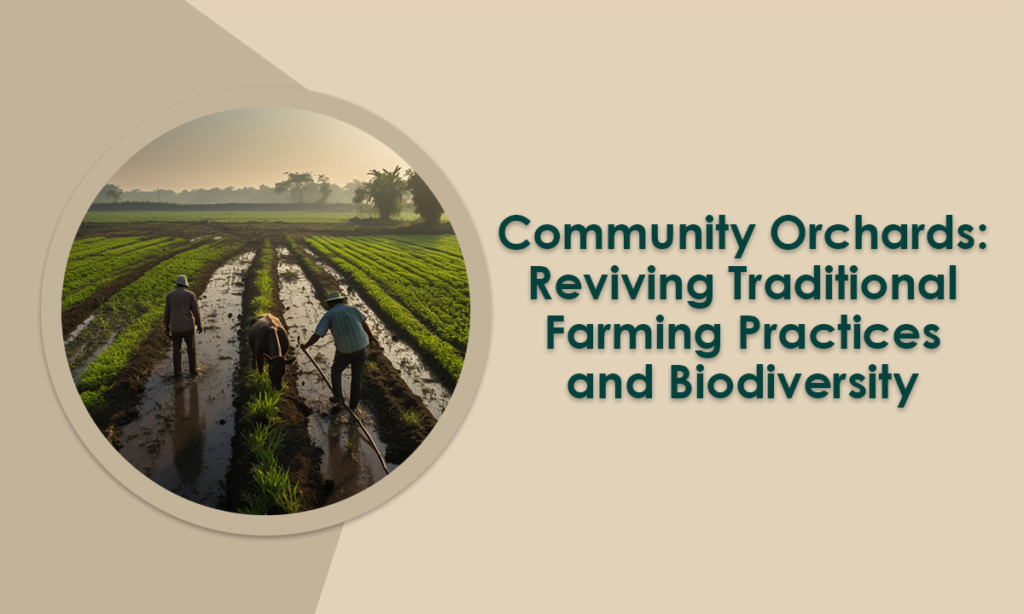Introduction
India has a rich agricultural heritage that embraces a symbiotic relationship between humans and nature. Traditional farming practices, handed down through generations, have played a pivotal role in sustaining the environment and fostering biodiversity. Community orchards, which involve collective farming and management of fruit-bearing trees, have emerged as a sustainable and eco-friendly way to revive these traditional practices while promoting biodiversity conservation.
In this blog post, we explore the significance of community orchards from the Indian perspective and their potential in fostering a greener and more sustainable future.
The Decline of Traditional Farming Practices
Over the years, India has witnessed a shift from traditional agricultural practices to modern, chemical-intensive farming methods. This transition has led to several challenges, including soil degradation, water depletion, loss of biodiversity, and a heavy reliance on external inputs. Additionally, large-scale monoculture farming has contributed to the loss of native plant species and endangered various animal species dependent on diverse ecosystems.
The Role of Community Orchards
Community orchards offer a glimmer of hope for restoring ecological balance and nurturing biodiversity. These orchards are collaborative efforts, where individuals from the community collectively cultivate and maintain fruit-bearing trees on shared land. By reintroducing traditional farming practices, these orchards have several benefits:
Biodiversity Conservation: Community orchards promote the cultivation of diverse fruit trees, providing habitats and food sources for a variety of birds, insects, and small mammals. This fosters biodiversity and contributes to the conservation of endangered species.
Sustainable Agriculture: Embracing organic and natural farming methods, community orchards reduce the reliance on chemical inputs, preserving soil health and promoting sustainable agricultural practices.
Water Conservation: Indigenous fruit tree species are often better adapted to local climates, requiring less water than non-native varieties. This aids in water conservation, especially in water-scarce regions.
Climate Resilience: Diverse plant species in community orchards contribute to ecosystem resilience, making them more adaptable to climate change impacts.
Food Security and Nutrition: Community orchards provide a sustainable source of fresh and nutritious fruits, improving the community’s food security and nutrition levels.
Community Orchards in India
Several grassroots organizations and government initiatives in India have started promoting community orchards:
Van Mahotsav: The annual tree-planting festival, Van Mahotsav, initiated in 1950, encourages tree plantation drives across the country, including community orchards.
Hariyali Mission: Launched by the Indian government, the Hariyali Mission aims to increase forest cover, promote afforestation, and encourage community-based tree planting activities.
NGOs and Farmer Cooperatives: Non-governmental organizations (NGOs) and farmer cooperatives actively promote the establishment of community orchards in various states.
Community-led Initiatives: Many local communities have taken the initiative to establish and manage orchards on common lands or in wastelands, fostering a sense of ownership and responsibility.
Conclusion
Community orchards hold tremendous potential in reviving traditional farming practices, fostering biodiversity, and promoting sustainable agriculture in India. By embracing collaborative efforts to cultivate diverse fruit trees, we can reclaim our agricultural heritage, which has always valued the coexistence of humans and nature.
Government support, public participation, and community involvement are crucial in nurturing these orchards and reaping their numerous benefits. As we embrace community orchards as a sustainable farming model, we pave the way for a greener, healthier, and more resilient India, where nature thrives, and communities flourish in harmony with the environment.
